500 start with M start with M
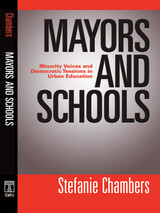
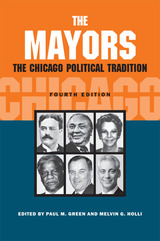
Chicago’s mayoral history is one of corruption and reform, scandal and ambition. This well-researched volume, more relevant than ever twenty-five years after its first edition, presents an intriguing and informative glimpse into the fascinating lives and legacies of Chicago’s most influential leaders.
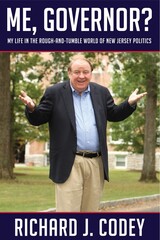
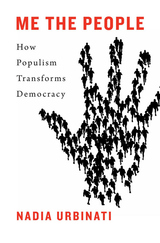
A timely and incisive assessment of what the success of populism means for democracy.
Populist movements have recently appeared in nearly every democracy around the world. Yet our grasp of this disruptive political phenomenon remains woefully inadequate. Politicians of all stripes appeal to the interests of the people, and every opposition party campaigns against the current establishment. What, then, distinguishes populism from run-of-the-mill democratic politics? And why should we be concerned by its rise?
In Me the People, Nadia Urbinati argues that populism should be regarded as a new form of representative government, one based on a direct relationship between the leader and those the leader defines as the “good” or “right” people. Populist leaders claim to speak to and for the people without the need for intermediaries—in particular, political parties and independent media—whom they blame for betraying the interests of the ordinary many. Urbinati shows that, while populist governments remain importantly distinct from dictatorial or fascist regimes, their dependence on the will of the leader, along with their willingness to exclude the interests of those deemed outside the bounds of the “good” or “right” people, stretches constitutional democracy to its limits and opens a pathway to authoritarianism.
Weaving together theoretical analysis, the history of political thought, and current affairs, Me the People presents an original and illuminating account of populism and its relation to democracy.
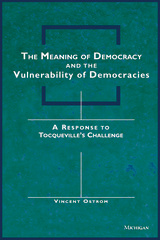
Arguing that democratic systems are characterized by self-governing--not state- governed--societies, Ostrom contends that the nature and strength of individual relationships and self-organizing behavior are critical to the creation and survival of a democratic political system. Ostrom begins with a basic contradiction identified by Alexis de Tocqueville. De Tocqueville suggested that if citizens acted on the basis of their natural inclinations they would expect government to provide for them and take care of their needs. Yet these conditions contradict what it means to be self-governing. Ostrom explores the social and cultural context necessary for a democratic system to flourish emphasizing the important role of ideas and the use of language in defining and understanding political life. Discussing differences in the ideas about social organization among various cultural and intellectual traditions, he considers the difficulties encountered over time in building democratic societies in America, Asia, Europe, and Africa. He outlines lessons from these experiences for the efforts to build democracy in the developing world and the countries emerging from communism.
Based on a lifetime of thinking about the social conditions necessary to support a democracy, this book makes a significant contribution to the recent discussion about civil society and the fragility of our formal and informal social institutions and will be of interest to social scientists, historians and all readers concerned with the state of democracy in the modern world.
Vincent Ostrom is Arthur F. Bentley Professor of Political Science Emeritus and Co-Director of the Workshop on Political Theory and Policy Analysis, Indiana University. He is the author of many works on political theory and public administration.

This is a remarkable historical and psychological examination of the enigma of Adolf Hitler—who he was, how he wielded power, and why he was destined to fail.
Beginning with Hitler’s early life, Sebastian Haffner probes the historical, political, and emotional forces that molded his character. In examining the inhumanity of a man for whom politics became a substitute for life, he discusses Hitler’s bizarre relationships with women, his arrested psychological development, his ideological misconceptions, his growing obsession with racial extermination, and the murderous rages of his distorted mind. Finally, Haffner confronts the most disturbing question of all: Could another Hitler rise to power in modern Germany?
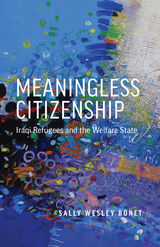
A searing critique of the “freedom” that America offers to the victims of its imperialist machinations of war and occupation
Meaningless Citizenship traces the costs of America’s long-term military involvement around the world by following the forced displacement of Iraqi families, unveiling how Iraqis are doubly displaced: first by the machinery of American imperialism in their native countries and then through a more pernicious war occurring on U.S. soil—the dismantling of the welfare state.
Revealing the everyday struggles and barriers that texture the lives of Iraqi families recently resettled to the United States, Sally Wesley Bonet draws from four years of deep involvement in the refugee community of Philadelphia. An education scholar, Bonet’s analysis moves beyond the prevalent tendency to collapse schooling into education. Focusing beyond the public school to other critical institutions, such as public assistance, resettlement programs, and healthcare, she shows how encounters with institutions of the state are an inherently educative process for both refugee youths and adults, teaching about the types of citizenship they are expected to enact and embody while simultaneously shaping them into laboring subjects in service of capitalism.
An intimate, in-depth ethnography, Meaningless Citizenship exposes how the veneer of American values—freedom, democracy, human rights—exported to countries like Iraq, disintegrates to uncover what is really beneath: a nation-state that prioritizes the needs of capitalism above the survival and wellbeing of its citizens.
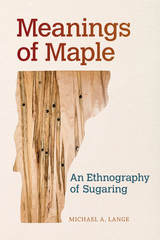
Readers will go deep into a Vermont sugar bush and its web of plastic tubes, mainline valves, and collection tanks. They will visit sugarhouses crammed with gas evaporators and reverse-osmosis machines. And they will witness encounters between sugar makers and the tourists eager to invest Vermont with mythological fantasies of rural simplicity.
So much more than a commodity study, Meanings of Maple frames a new approach for evaluating the broader implications of iconic foodways, and it will animate conversations in food studies for years to come.
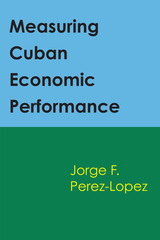
Analysts attempting to assess economic growth in revolutionary Cuba are faced with two formidable obstacles: (1) official macroeconomic indicators published by the government are scarce and sometimes inconsistent because of frequent changes in the method of calculation; and (2) these indicators are not compatible with those produced by market economies because of differences in national income concepts. Because of these obstacles, it is difficult to analyze the performance of Cuba’s economy over time and to compare its economic performance directly with that of other nations.
Using a variant of the method developed by Abram Bergson to estimate the growth rates of the Soviet Union and subsequently applied to centrally planned economies in Eastern Europe, Jorge Perez-López has estimated the growth rate of the Cuban economy in real terms for the 1965–1982 period. His estimated indexes suggest that the Cuban economy expanded at a considerably slower pace than would be implied by official data.
By constructing yardsticks of economic performance for revolutionary Cuba that are compatible with those used by Western nations, Perez-López provides for the first time a basis for analyzing the real growth of the Cuban economy during the revolutionary period.
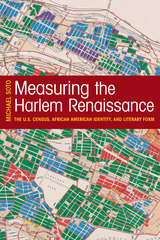
Measuring the Harlem Renaissance sifts through a wide range of authors and ideas—from W. E. B. Du Bois, Rudolph Fisher, and Nella Larsen to Zora Neale Hurston, Langston Hughes, and Wallace Thurman, and from census history to the Great Migration—to provide a fresh take on late nineteenth—and twentieth—century literature and social thought. Soto reveals how Harlem came to be known as the "cultural capital of black America," and how these ideas left us with unforgettable fiction and poetry.


Measuring the Performance of the Hollow State is the first in-depth look at the influence of performance measurement on the effectiveness of the federal government. To do this, the authors examine the influence of the Government Performance and Results Act of 1993 (with consideration of the later Program Assessment Rating Tool of 2002) on federal performance measurement, agency performance, and program outcomes. They focus a systematic examination on five agencies in the U.S. Department of Health and Human Services—the Food and Drug Administration, the Centers for Medicare and Medicaid Services, the Health Resources and Services Administration, the National Institutes of Health, and the Indian Health Service. Besides representing a wide range of federal government organizational structures and program formats, these agencies offer a diverse array of third-party arrangements including states, native American tribes, scientists, medical schools, and commercial and nonprofit health care intermediaries and carriers.
Exploring the development of performance measures in light of widely varying program mandates, the authors look at issues that affect the quality of this measurement and particularly the influence of program performance by third parties. They consider factors such as goal conflict and ambiguity, politics, and the critical role of intergovernmental relations in federal program performance and performance measurement. Through their findings, they offer illumination to two major questions in public management today—what are the uses and limitations of performance measurement as a policy and management tool and how does performance measurement work when applied to the management of third-party government?
While scholars and students in public administration and governmental reform will find this book of particular interest, it will also be of use to anyone working in the public sector who would like to have a better understanding of performance measurement.
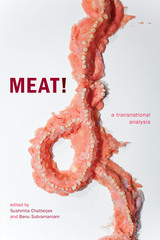
Contributors. Neel Ahuja, Irina Aristarkhova, Sushmita Chatterjee, Mel Y. Chen, Kim Q. Hall, Jennifer A. Hamilton, Anita Mannur, Elspeth Probyn, Parama Roy, Banu Subramaniam, Angela Willey, Psyche Williams-Forson
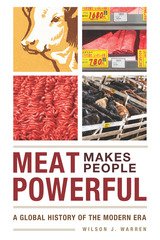
From large-scale cattle farming to water pollution, meat— more than any other food—has had an enormous impact on our environment. Historically, Americans have been among the most avid meat-eaters in the world, but long before that meat was not even considered a key ingredient in most civilizations’ diets. Labor historian Wilson Warren, who has studied the meat industry for more than a decade, provides this global history of meat to help us understand how it entered the daily diet, and at what costs and benefits to society.
Spanning from the nineteenth century to current and future trends, Warren walks us through the economic theory of food, the discovery of protein, the Japanese eugenics debate around meat, and the environmental impact of livestock, among other topics. Through his comprehensive, multifaceted research, he provides readers with the political, economic, social, and cultural factors behind meat consumption over the last two centuries. With a special focus on East Asia, Meat Makes People Powerful reveals how national governments regulated and oversaw meat production, helping transform virtually vegetarian cultures into major meat consumers at record speed.
As more and more Americans pay attention to the sources of the meat they consume, Warren’s compelling study will help them not only better understand the industry, but also make more informed personal choices. Providing an international perspective that will appeal to scholars and nutritionists alike, this timely examination will forever change the way you see the food on your plate.

Contributors include: Dorothee Brantz, Kyri Claflin, Jared Day, Roger Horowitz, Lindgren Johnson, Ian MacLachlan, Christopher Otter, Dominic Pacyga, Richard Perren, Jeffrey Pilcher, and Sydney Watts.
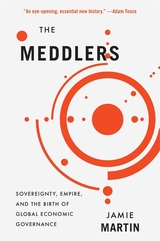
“The Meddlers is an eye-opening, essential new history that places our international financial institutions in the transition from a world defined by empire to one of nation states enmeshed in the world economy.”
—Adam Tooze, Columbia University
An award-winning history traces the origins of global economic governance—and the political conflicts it generates—to the aftermath of World War I.
International economic institutions like the International Monetary Fund and World Bank exert incredible influence over the domestic policies of many states. These institutions date from the end of World War II and amassed power during the neoliberal era of the late twentieth century. But as Jamie Martin shows, if we want to understand their deeper origins and the ideas and dynamics that shaped their controversial powers, we must turn back to the explosive political struggles that attended the birth of global economic governance in the early twentieth century.
The Meddlers tells the story of the first international institutions to govern the world economy, including the League of Nations and Bank for International Settlements, created after World War I. These institutions endowed civil servants, bankers, and colonial authorities from Europe and the United States with extraordinary powers: to enforce austerity, coordinate the policies of independent central banks, oversee development programs, and regulate commodity prices. In a highly unequal world, they faced a new political challenge: was it possible to reach into sovereign states and empires to intervene in domestic economic policies without generating a backlash?
Martin follows the intense political conflicts provoked by the earliest international efforts to govern capitalism—from Weimar Germany to the Balkans, Nationalist China to colonial Malaya, and the Chilean desert to Wall Street. The Meddlers shows how the fraught problems of sovereignty and democracy posed by institutions like the IMF are not unique to late twentieth-century globalization, but instead first emerged during an earlier period of imperial competition, world war, and economic crisis.

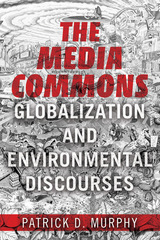
The media draws the cultural boundaries of our environmental imagination--and influences just who benefits. Murphy's analysis emphasizes social context, institutional alignments, and commercial media's ways of rendering discussion. He identifies and examines key terms, phrases, and metaphors as well as the ways consumers are presented with ideas like agency and the place of nature. What emerges is the link between pervasive messaging and an "environment" conjured by our media-saturated social imagination. As the author shows, today's complex, integrated media networks shape, frame, and deliver many of our underlying ideas about the environment. Increasingly--and ominously--individuals and communities experience these ideas not only in the developed world but in the increasingly consumption-oriented Global South.
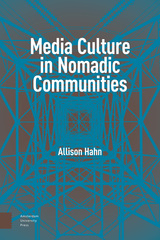
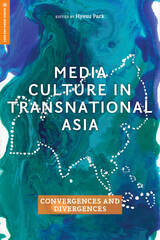
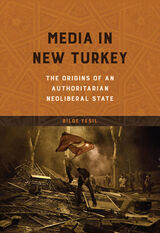
Yesil confronts essential questions regarding: the role of the state and military in building the structures that shaped Turkey's media system; media adaptations to ever-shifting contours of political and economic power; how the far-flung economic interests of media conglomerates leave them vulnerable to state pressure; and the ways Turkey's politicized judiciary criminalizes certain speech.
Drawing on local knowledge and a wealth of Turkish sources, Yesil provides an engrossing look at the fault lines carved by authoritarianism, tradition, neoliberal reform, and globalization within Turkey's increasingly far-reaching media.
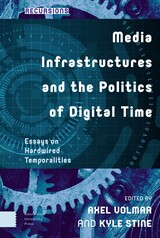
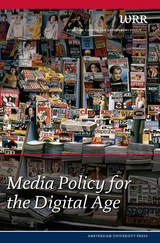
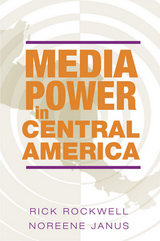
Rick Rockwell and Noreene Janus examine the region country by country and deal with the specific conditions of government-sponsored media repression, economic censorship, corruption, and consumer trends that shape the political landscape. Challenging the notion of the media as a democratizing force, Media Power in Central America shows how governments use the media to block democratic reforms and outlines the difficulties of playing watchdog to rulers who use the media as a tool of power.
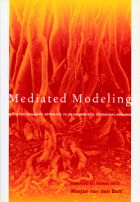
Mediated modeling is an innovative new approach that enhances the use of computer models as invaluable tools to guide policy and management decisions. Rather than having outside experts dispensing answers to local stakeholders, mediated modeling brings together diverse interests to raise the shared level of understanding and foster a broad and
deep consensus. It provides a structured process based on system dynamics thinking in which community members, government officials, industry representatives, and other stakeholders can work together to produce a coherent, simple but elegant simulation model.
Mediated Modeling by Marjan Van Den Belt is a practical guide to participatory modeling for both practitioners and students, one that is firmly theoretically grounded in the field of systems dynamics and environmental modeling. Five in-depth case studies describe the successful use of the technique in a variety of settings, and a final chapter synthesizes the lessons highlighted by the case studies.
Mediated Modeling's step-by-step description of the techniques and practical advice regarding implementation offer a real-world solution for all those seeking to make sound decisions about the environment.
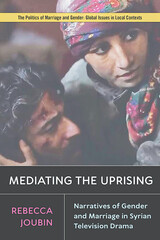
While for some screenwriters a return to pre-2011 life would be welcome after so much bloodshed, others advocated profound cultural and social transformation, instead. They employed marriage and gender metaphors in the stories they wrote to engage in political critique, even at the risk of creating marketing difficulties for the shows or they created escapist stories such as transnational adaptations and Old Damascus tales. Serving as heritage preservation, Mediating the Uprising underscores that television drama creators in Syria have many ways of engaging in protest, with gender and marriage at the heart of the polemic.
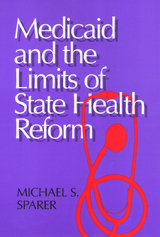
With the defeat of national health reform, many liberals have looked to the states as the source of health policy innovation. At the same time, many in the new Republican majority and several governors also support increased state control. In contrast, Michael S. Sparer convincingly argues that states by themselves can neither satisfy the liberal hope for universal coverage nor the conservative hope for cost containment. He also points to two critical drawbacks to a state-dominated health care system: the variation in coverage among states and the intergovernmental tension that would inevitably accompany such a change.
Supporting his arguments, Sparer analyzes the contradictions in operations and policies between the New York and California Medicaid programs. For instance, why does New York spend an average of $7,286 on its Medicaid beneficiaries and California an average of $2,801? The answer, the author suggests, is rooted in bureaucratic politics. California officials enjoy significant bureaucratic autonomy, while the system in New York is fragmented, decentralized, and interest-group dominated. The book supports this conclusion by exploring nursing home and home care policy, hospital care policy, and managed care policy in the two states. Sparer's dissection of the consequences of state-based reform make a persuasive case for national health insurance.

Medicaid, one of the largest federal programs in the United States, gives grants to states to provide health insurance for over 60 million low-income Americans. As private health insurance benefits have relentlessly eroded, the program has played an increasingly important role. Yet Medicaid’s prominence in the health care arena has come as a surprise.
Many astute observers of the Medicaid debate have long claimed that “a program for the poor is a poor program” prone to erosion because it serves a stigmatized, politically weak clientele. Means-tested programs for the poor are often politically unpopular, and there is pressure from fiscally conservative lawmakers to scale back the $350-billion-per-year program even as more and more Americans have come to rely on it. For their part, health reformers had long assumed that Medicaid would fade away as the country moved toward universal health insurance. Instead, Medicaid has proved remarkably durable, expanding and becoming a major pillar of America’s health insurance system.
In Medicaid Politics, political scientist Frank J. Thompson examines the program’s profound evolution during the presidential administrations of Bill Clinton, George W. Bush, and Barack Obama and its pivotal role in the epic health reform law of 2010. This clear and accessible book details the specific forces embedded in American federalism that contributed so much to Medicaid’s growth and durability during this period. It also looks to the future outlining the political dynamics that could yield major program retrenchment.

This volume takes aim at that problem, while taking stock of where we are in our attempts to solve it. Much of this analysis focuses on the capacity to measure the value of technological change and other health care innovations. A key finding suggests that growth in health care spending has coincided with an increase in products and services that together reduce mortality rates and promote additional health gains. Concerns over the apparent increase in unit prices of medical care may thus understate positive impacts on consumer welfare. When appropriately adjusted for such quality improvements, health care prices may actually have fallen. Provocative and compelling, this volume not only clarifies one of the more nebulous issues in health care analysis, but in so doing addresses an area of pressing public policy concern.

Governments throughout the industrialized world make decisions that fundamentally affect the quality and accessibility of medical care. In the United States, despite the absence of universal health insurance, these decisions have great influence on the practice of medicine.
In Medical Governance, David Weimer explores an alternative regulatory approach to medical care based on the delegation of decisions about the allocation of scarce medical resources to private nonprofit organizations. He investigates the specific development of rules for the U.S. organ transplant system and details the conversion of a voluntary network of transplant centers to one private rulemaker: the Organ Procurement and Transplantation Network (OPTN).
As the case unfolds, Weimer demonstrates that the OPTN is more efficient, nimble, and better at making evidence-based decisions than a public agency; and the OPTN also protects accountability and the public interest more than private for-profit organizations. Weimer addresses similar governance arrangements as they could apply to other areas of medicine, including medical records and the control of Medicare expenditures, making this timely and useful case study a valuable resource for debates over restructuring the U.S. health care system.

Written in a thoroughly inviting, jargon-free style, Medical Malpractice and the American Jury places those cases that go to trial in the broader context of litigation, noting that only about ten percent of malpractice cases ever result in trials. Of those that do go to trial, the author notes, more than two out of three cases are decided in the doctor's favor--repudiating the view that jurors are inherently biased against doctors and are motivated more by sympathy for the plaintiff than by the facts of the case.
Neil Vidmar comprehensively addresses all the claims that have been leveled against the performance of malpractice juries. For example, he compares actual jury decisions on negligence with neutral physicians' ratings of whether negligence occurred in the medical treatment and finds a remarkable consistency--repudiating the view that jurors are unable to understand experts or uncritically defer to their opinion.
"Medical Malpractice and the American Jury is quite simply the most compelling, comprehensive examination of the American jury system yet written. It brings reason and fact to the debate in a way that puts the lie to the many myths surrounding medical negligence cases. For anyone genuinely interested in just solutions, this book should be required reading. To act in ignorance of its findings invites disaster." --Trial
"For anyone really interested in the evidence about the daily grind of the courthouse mill, Neil Vidmar's Medical Malpractice and the American Jury is a good place to start." --Washington Post Book World
Neil Vidmar is Professor of Social Science and Law, Duke Law School, and Professor of Psychology, Duke University.

A complete understanding of the particular and peculiar structure of Medicare can be gained only by considering the ideas, politics, and institutions of the 1960s that shaped it. With this historical perspective, the articles in this collection can move beyond partisan arguments and politically motivated reform proposals. Instead, they outline educated guidelines for improving Medicare and debunk commonly held but false assumptions about the program. In "How Not to Think about Medicare" the field’s most noted scholar, Theodore Marmor, exposes four such misconceptions, including the program’s seeming inability to control costs and ward off what some call a fiscal tsunami—the aging of the baby boomers. Other contributions address frequently overlooked functions of Medicare. While the program is known for its universal health coverage for the elderly and the disabled, for instance, Medicare also serves a crucial role in overseeing hospital performance and furthering health education. This special issue concludes with a discussion of Marmor’s recently revised classic book, The Politics of Medicare, by five leading specialists who interpret the present Medicare program in light of its original construct and current political influences.
Contributors. Michael Gusmano, Jacob Hacker, Nancy M. Kane, Stephen A. Magnus, Theodore Marmor, Jonathan Oberlander, Eric M. Patashnik, Mark A. Peterson, Mark J. Schlesinger, Carolyn Tuohy, Bruce Vladeck, Julian Zelizer

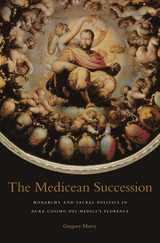
In 1537, Florentine Duke Alessandro dei Medici was murdered by his cousin and would-be successor, Lorenzino dei Medici. Lorenzino's treachery forced him into exile, however, and the Florentine senate accepted a compromise candidate, seventeen-year-old Cosimo dei Medici. The senate hoped Cosimo would act as figurehead, leaving the senate to manage political affairs. But Cosimo never acted as a puppet. Instead, by the time of his death in 1574, he had stabilized ducal finances, secured his borders while doubling his territory, attracted an array of scholars and artists to his court, academy, and universities, and, most importantly, dissipated the perennially fractious politics of Florentine life.
Gregory Murry argues that these triumphs were far from a foregone conclusion. Drawing on a wide variety of archival and published sources, he examines how Cosimo and his propagandists successfully crafted an image of Cosimo as a legitimate sacral monarch. Murry posits that both the propaganda and practice of sacral monarchy in Cosimo's Florence channeled preexisting local religious assumptions as a way to establish continuities with the city's republican and renaissance past. In The Medicean Succession, Murry elucidates the models of sacral monarchy that Cosimo chose to utilize as he deftly balanced his ambition with the political sensitivities arising from existing religious and secular traditions.

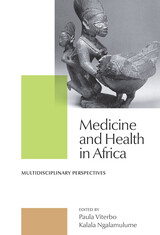
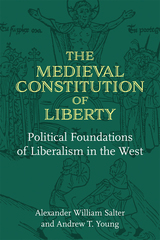
Why did enduring traditions of economic and political liberty emerge in Western Europe and not elsewhere? Representative democracy, constitutionalism, and the rule of law are crucial for establishing a just and prosperous society, which we usually treat as the fruits of the Renaissance and Enlightenment, as Western European societies put the Dark Ages behind them.
In The Medieval Constitution of Liberty, Salter and Young point instead to the constitutional order that characterized the High Middle Ages. They provide a historical account of how this constitutional order evolved following the fall of the Western Roman Empire. This account runs from the settlements of militarized Germanic elites within the imperial frontiers, to the host of successor kingdoms in the sixth and seventh centuries, and through the short-lived Carolingian empire of the late eighth and ninth centuries and the so-called “feudal anarchy” that followed its demise. Given this unique historical backdrop, Salter and Young consider the resulting structures of political property rights. They argue that the historical reality approximated a constitutional ideal type, which they term polycentric sovereignty. Salter and Young provide a theoretical analysis of polycentric sovereignty, arguing that bargains between political property rights holders within that sort of constitutional order will lead to improvements in governance.
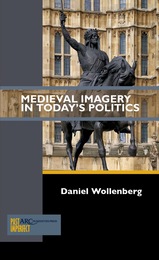
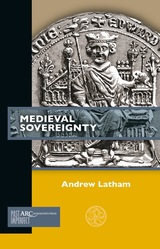


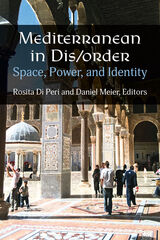
Mediterranean in Dis/order reveals the connection between space and politics by examining the role that space has played in insurgencies, conflicts, uprisings, and mobilities in the Mediterranean region. With this approach, the authors are able to challenge well-established beliefs about the power structure of the state across different disciplines (including political science, history, sociology, geography, and anthropology), and its impact on the conception, production, and imagination of space in the broader Mediterranean. Further, they contribute to particular areas of studies, such as migration, political Islam, mobilization, and transition to democracy, among others. The book, infusing critical theory, unveils original and revelatory case studies in Tunisia, Libya, Lebanon, Turkey, Syria, Morocco, and the EU Mediterranean policy, through a various set of actors and practices—from refugees and migrations policies, to Islamist or students’ movements, architectural sites, or movies. This multidisciplinary perspective on space and power provides a valuable resource for practitioners interested in how space, context, and time interact to produce institutions, political subjectivities, and asymmetries of power, particularly since the turning point of the Arab uprisings. The book also helps readers understand the conditions under which the uprisings develop, giving a clearer picture about various national, regional, and international dynamics.
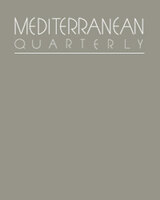
The potential role of NATO is controversial but crucial to the future of the Mediterranean. Some contributors suggest that the southward expansion of NATO could be an important first step toward stability, while others argue that the Mediterranean should be treated as an integrated geostrategic region, with a central place in Western security considerations.
Highlighting this issue is a foreword by former U.S. Secretary of State George P. Schultz, and a piece focusing on NATO in the Mediterranean by Javier Solana, the Secretary General of NATO. Other essays discuss the comparative experience of UNPROFOR and IFOR in the former Yugoslavia; the role of Italy in the future of the Mediterranean; the economic challenges facing the Middle East; and the role of Israel and its relationship to its neighbors. Mediterranean Security at the Crossroads is one of the first in-depth looks at this region from a strictly post—Cold War perspective.

New essays in this expanded volume include a reflection by former President Jimmy Carter on the causes of war and their links to human suffering, a prophetic analysis of the post-Cold War environment in the Mediterranean by former U.N. Secretary General Boutros-Boutros Ghali, an essay on the strategic significance of Turkey in the eastern Mediterranean by the former Turkish ambassador to the United States, and, in light of recent events in Kosovo and elsewhere in the former Yugoslavia, a piece on the issue of Balkan security by the editor. Introducing the volume is a foreword by former U.S. Secretary of State George P. Schultz and an essay focusing on NATO in the Mediterranean by Javier Solana, the Secretary General of NATO. Central to the Mediterranean debate is the question of NATO’s role in its future. Some contributors suggest that the southward expansion of NATO could be an important first step toward stability, while others argue that the Mediterranean should be treated as an integrated geostrategic region, with a central place in Western security considerations. Other essays discuss the comparative experience of UNPROFOR and IFOR in the former Yugoslavia; the role of Italy in the future of the Mediterranean; the economic challenges facing the Middle East; and the role of Israel and its relationship to its neighbors.
Mediterranean Security at the Crossroads is one of the first in-depth looks at this region from a strictly post-Cold War perspective.
Contributors. Hanan Bar-On, Ted Galen Carpenter, Jimmy Carter, Charles G. Cogan, Gregorios Demestichas, Boutros-Boutros Ghali, Carlo Jean, Nuzhet Kandemir, Nicolai A. Kovalsky, William H. Lewis, Peter H. Liotta, John A. MacInnis, Phebe Marr, Matthew Nimetz, George P. Schultz, Javier Solana, Richard F. Staar, Nikolaos A. Stavrou, George Vella, W. Bruce Weinrod
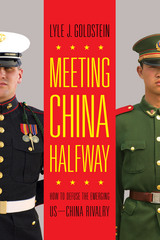
Though a US-China conflict is far from inevitable, major tensions are building in the Asia-Pacific region. These strains are the result of historical enmity, cultural divergence, and deep ideological estrangement, not to mention apprehensions fueled by geopolitical competition and the closely related “security dilemma.”
Despite worrying signs of intensifying rivalry, few observers have provided concrete paradigms to lead this troubled relationship away from disaster. This book is dramatically different in that Lyle J. Goldstein’s focus is on laying bare both US and Chinese perceptions of where their interests clash and proposing new paths to ease bilateral tensions through compromise. Each chapter contains a “cooperation spiral” —the opposite of an escalation spiral—to illustrate these policy proposals. Goldstein makes one hundred policy proposals over the course of this book to inaugurate a genuine debate regarding cooperative policy solutions to the most vexing problems in US-China relations.
Goldstein not only parses findings from American scholarship but also breaks new ground by analyzing hundreds of Chinese-language sources, including military publications, never before evaluated by Western experts. Meeting China Halfway, new in paperback, remains a refreshing and unique contribution to the study of the world’s most important bilateral relationship.

This book is about the “losers” of the Meiji Restoration and the supporters who promoted their legacy. Although the violence of the Meiji Restoration is typically downplayed, the trauma was real, and those who felt marginalized from the mainstream throughout modern Japan looked to these losers as models of action.
Using a wide range of sources, from essays by former Tokugawa supporters like Fukuzawa Yukichi to postwar film and “lost decade” manga, Michael Wert traces the shifting portrayals of Restoration losers. By highlighting the overlooked sites of memory such as legends about buried gold, the awarding of posthumous court rank, or fighting over a disembodied head, Wert illustrates how the process of commemoration and rehabilitation allows individuals a voice in the formation of national history. He argues that the commingling of local memory activists and nationally-known politicians, academics, writers, and treasure hunters formed interconnecting memory landscapes that promoted local figures as potential heroes in modern Japan.

This book is about the “losers” of the Meiji Restoration and the supporters who promoted their legacy. Although the violence of the Meiji Restoration is typically downplayed, the trauma was real, and those who felt marginalized from the mainstream throughout modern Japan looked to these losers as models of action.
Using a wide range of sources, from essays by former Tokugawa supporters like Fukuzawa Yukichi to postwar film and “lost decade” manga, Michael Wert traces the shifting portrayals of Restoration losers. By highlighting the overlooked sites of memory such as legends about buried gold, the awarding of posthumous court rank, or fighting over a disembodied head, Wert illustrates how the process of commemoration and rehabilitation allows individuals a voice in the formation of national history. He argues that the commingling of local memory activists and nationally-known politicians, academics, writers, and treasure hunters formed interconnecting memory landscapes that promoted local figures as potential heroes in modern Japan.

Credit for the swift unification of Japan following the 1868 overthrow of the Tokugawa shogunate is usually given to the national leaders who instigated the coup and formed the new Meiji government. But is brilliant leadership at the top sufficient to explain how regional separatist tendencies and loyalties to the old lords were overcome in the formation of a nationally unified state? On the contrary, argues James C. Baxter. Though plans were drawn up by policy makers in Tokyo, the efforts of citizens all over the country were required to implement these plans and create a sense of national identity among local populations.
Drawing on extensive archival resources, Baxter describes the transformation of the Tokugawa domain of Kaga into the Meiji prefecture of Ishikawa. The result is a richly detailed study that helps explain how Japan achieved national unity without the bloody struggles that have often accompanied modernization and nation-building.

Meltdown Expected tells the story of the power shifts from late 1978 through 1979 whose repercussions are still being felt. Iran’s revolution led to a hostage crisis while neighbouring Afghanistan became the site of a proxy war between the USSR and the US, who supplied aid to Islamic mujahideen fighters that would later form the Taliban. Meanwhile, as tragedies like the Jonestown mass suicide and the assassination of Harvey Milk captured the nation’s attention, the government quietly reasserted and expanded the FBI’s intelligence powers. Drawing from recently declassified government documents and covering everything from Three Mile Island to the rise of punk rock, Aaron J. Leonard paints a vivid portrait of a tumultuous yet pivotal time in American history.
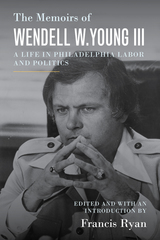
Philadelphia native Wendell W. Young III was one of the most important American labor leaders in the last half of the twentieth century. An Acme Markets clerk in the 1950s and ’60s, he was elected top officer of the Retail Clerks Union when he was twenty-four. His social justice unionism sought to advance wages while moving beyond collective bargaining to improve the conditions of the working-class majority, whether in a union or not. Young quickly gained a reputation for his independence, daring at times to publicly criticize the policies of the city’s powerful AFL-CIO leadership and tangle with the city’s political machine.
Editor Francis Ryan, whose introduction provides historical context, interviewed Young about his experiences working in the region’s retail and food industry, measuring the changes over time and the tangible impact that union membership had on workers. Young also describes the impact of Philadelphia’s deindustrialization in the 1970s and ’80s and recounts his activism for civil rights and the anti-war movements as well as on John F. Kennedy’s presidential campaign.
The Memoirs of Wendell W. YoungIII provides the most extensive labor history of late twentieth-century Philadelphia yet written.

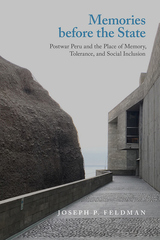
Memories before the State examines the discussions and debates surrounding the creation of the Place of Memory, Tolerance, and Social Inclusion (LUM), a national museum in Peru that memorializes the country’s internal armed conflict of the 1980s and 1990s. Emerging from a German donation that the Peruvian government initially rejected, the Lima-based museum project experienced delays, leadership changes, and limited institutional support as planners and staff devised strategies that aligned the LUM with a new class of globalized memorial museums and responded to political realities of the country’s postwar landscape. The book analyzes forms of authority that emerge as an official institution seeks to incorporate and manage diverse perspectives on recent violence.
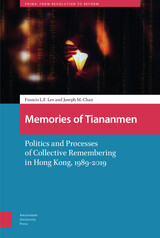
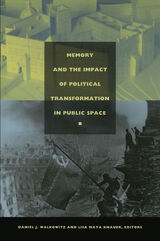
This collection expands the scope of what is considered public history by pointing to silences and absences that are as telling as museums and memorials. Contributors remind us that for every monument that is erected, others—including one celebrating Sri Lanka’s independence and another honoring the Unknown Russian Soldier of World War II—remain on the drawing board. While some sites seem woefully underserved by a lack of public memorials—as do post–Pinochet Chile and post–civil war El Salvador—others run the risk of diluting meaning through overexposure, as may be happening with Israel’s Masada. Essayists examine public history as it is conveyed not only in marble and stone but also through cityscapes and performances such as popular songs and parades.
Contributors
James Carter
John Czaplicka
Kanishka Goonewardena
Lisa Maya Knauer
Anna Krylova
Teresa Meade
Bill Nasson
Mary Nolan
Cynthia Paces
Andrew Ross
Daniel Seltz
T. M. Scruggs
Irina Carlota Silber
Daniel J. Walkowitz
Yael Zerubavel
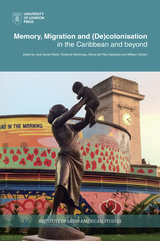
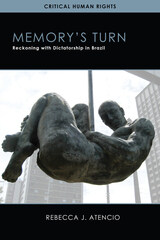
In clear and engaging prose, Rebecca J. Atencio tells the story of the slow turn to memory in Brazil, a turn that has taken place in both politics and in cultural production. She shows how testimonial literature, telenovelas, literary novels, theatrical plays, and memorials have interacted with policies adopted by the Brazilian state, often in unexpected ways. Under the right circumstances, official and cultural forms of reckoning combine in Brazil to produce what Atencio calls cycles of cultural memory. Novel meanings of the past are forged, and new cultural works are inspired, thus creating the possibility for further turns in the cycle.
The first book to analyze Brazil’s reckoning with dictatorship through both institutional and cultural means, Memory’s Turn is a rich, informative exploration of the interplay between these different modes of memory reconstruction.
Winner, Alfred B. Thomas Award, Southeastern Council of Latin American Studies
Honorable Mention, Roberto Reis Book Prize, Brazilian Studies Association

With a new foreword by New York's former governor, Mario Cuomo, this revised and updated edition of Memos to the Governor is a concise guidebook that takes the reader behind governmental fiscal gobbledygook to explain in clear, understandable prose the technical, economic, and political dynamics of budget making. At all levels of government, the budget has become the battleground for policymaking and politics. This book helps current and future public administrators untangle the knotty processes of budget preparation and implementation.
Dall W. Forsythe, who served as budget director under Governor Cuomo, outlines the budgeting process through a series of memos from a budget director to a newly elected governor—a format that helps readers with little or no background to understand complicated financial issues. He covers all of the steps of budget preparation, from strategy to execution, explaining technical vocabulary, and discussing key topics including baseline budgeting, revenue forecasting, and gap-closing options.
Forsythe brings fresh insights into such issues as the importance of a multiyear strategic budget plan, the impact of the business cycle on state budgets, the tactical problems of getting budgets adopted by legislatures, and, of course, the relationship between governor and budget officer. Memos to the Governor is a painless, practical introduction to budget preparation for students of and practitioners in public administration and public-sector financial management.

This revised and updated edition of Memos to the Governor is a concise and highly readable guidebook that explains in clear, understandable prose the technical, economic, and political dynamics of budget making. Updated with many new examples of budget quandaries from recent years, this book helps current and future public administrators untangle the knotty processes of budget preparation and implementation.
Authors Dall W. Forsythe and Donald J. Boyd outline the budgeting process through a series of memos from a budget director to a newly elected governor—a format that helps readers with little or no background understand complicated financial issues. They cover all of the steps of budget preparation, from strategy to execution, explaining technical vocabulary, and discussing key topics including baseline budgeting, revenue forecasting, and gap-closing options.
Forsythe and Boyd bring fresh insights into such issues as the importance of a multiyear strategic budget plan, the impact of the business cycle on state budgets, the tactical problems of getting budgets adopted by legislatures, and, of course, the relationship between governor and budget officer. Memos to the Governor is a painless, practical introduction to budget preparation for students of and practitioners in public administration and public-sector financial management.
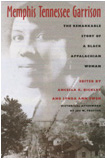
As a black Appalachian woman, Memphis Tennessee Garrison belonged to a demographic category triply ignored by historians.
The daughter of former slaves, she moved to McDowell County, West Virginia, at an early age and died at ninety-eight in Huntington. The coalfields of McDowell County were among the richest seams in the nation. As Garrison makes clear, the backbone of the early mining work force—those who laid the railroad tracks, manned the coke ovens, and dug the coal—were black miners. These miners and their families created communities that became the centers of the struggle for unions, better education, and expanded civil rights. Memphis Tennessee Garrison, an innovative teacher, administrative worker at U.S. Steel, and vice president of the National Board of the NAACP at the height of the civil rights struggle (1963-66), was involved with all of these struggles.
In many ways, this oral history, based on interview transcripts, is the untold and multidimensional story of African American life in West Virginia, as seen through the eyes of a remarkable woman. She portrays a courageous people who organize to improve their working conditions, send their children to school and then to college, own land, and support a wide range of cultural and political activities.

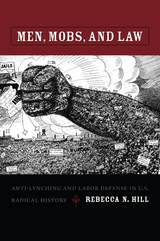
As Hill explains, labor defense activists first drew on populist logic, opposing the masses to the state in their campaigns, while anti-lynching activists went in the opposite direction, castigating “the mob” and appealing to the law. Showing that this difference stems from the different positions of whites and Blacks in the American legal system, Hill’s comparison of anti-lynching organizing and radical labor defenses reveals the conflicts and intersections between antiracist struggle and socialism in the United States.
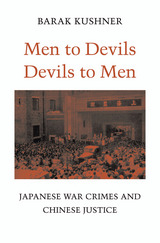
The Japanese Army committed numerous atrocities during its pitiless campaigns in China from 1931 to 1945. When the Chinese emerged victorious with the Allies at the end of World War II, many seemed ready to exact retribution for these crimes. Rather than resort to violence, however, they chose to deal with their former enemy through legal and diplomatic means. Focusing on the trials of, and policies toward, Japanese war criminals in the postwar period, Men to Devils, Devils to Men analyzes the complex political maneuvering between China and Japan that shaped East Asian realpolitik during the Cold War.
Barak Kushner examines how factions of Nationalists and Communists within China structured the war crimes trials in ways meant to strengthen their competing claims to political rule. On the international stage, both China and Japan propagandized the tribunals, promoting or blocking them for their own advantage. Both nations vied to prove their justness to the world: competing groups in China by emphasizing their magnanimous policy toward the Japanese; Japan by openly cooperating with postwar democratization initiatives. At home, however, Japan allowed the legitimacy of the war crimes trials to be questioned in intense debates that became a formidable force in postwar Japanese politics.
In uncovering the different ways the pursuit of justice for Japanese war crimes influenced Sino-Japanese relations in the postwar years, Men to Devils, Devils to Men reveals a Cold War dynamic that still roils East Asian relations today.
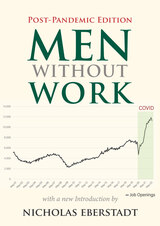
The grim truth: over six million prime-age men were neither working nor looking for work. Conventional unemployment measures ignored these labor force dropouts, but their ranks had been rising relentlessly for half a century. Eberstadt’s unflinching analysis was, in the words of The New York Times, “an unsettling portrait not just of male unemployment, but also of lives deeply alienated from civil society.”
The famed American work ethic was once near universal: men of sound mind and body took pride in contributing to their communities and families. No longer, warned Eberstadt. And now—six years and one catastrophic pandemic later—the problem has not only worsened: it has seemingly been spreading among prime-age women and workers over fifty-five.
In a brand new introduction, Eberstadt explains how the government’s response to Covid-19 inadvertently exacerbated the flight from work in America. From indiscriminate pandemic shutdowns to almost unconditional “unemployment” benefits, Americans were essentially paid not to work.
Thus today, despite the vaccine rollouts, inexplicable numbers of working age men and women are sitting on the sidelines while over 11 million jobs go unfilled. Current low rates of unemployment, touted by pundits and politicians, are grievously misleading. The truth is that fewer prime-age American men are looking for readily available work than at any previous juncture in our history. And others may be catching the “Men Without Work” virus too.
Given the devastating economic impact of the Covid calamity and the unforeseen aftershocks yet to come, this reissue of Eberstadt’s groundbreaking work is timelier than ever.

Long famous as a political, social, and cultural gadfly, journalist and essayist H. L. Mencken was unafraid to speak his mind on controversial topics and to express his views in a deliberately provocative manner.
Mencken was prolific; much of his best work lies buried in the newspapers and magazines in which it originally appeared. Mencken’s America is a sampling of this uncollected work, arranged to present the wide-ranging treatise on American culture that Mencken himself never wrote.
The core of the book is a series of six articles on “The American” published in the Smart Set in 1913-14. Never before reprinted, they embody the essence of Mencken’s views on the deficiencies of his countrymen.
What was the problem with America? For Mencken, it could be summed up in one word: Puritanism. Puritanism accounted for much that was wrong with American culture: the prevalence of “militant morality” represented by Prohibition, by campaigns against prostitution, and by religious fundamentalism. American hostility toward the fine arts led to furious attempts to suppress any work of art that was thought to contravene conventional morality-attempts that Mencken chronicles with impressive scholarship in the essay “Puritanism as a Literary Force.”
Mencken reserved his greatest scorn for American political institutions. Opposed to the very principle of democracy and universal suffrage, he maintained that, in the absence of an educated electorate, all politicians are compelled to become demagogues.
Bracing, infuriating, and pungent, H. L. Mencken’s writings retain their relevance even after the passage of nearly a hundred years, cogently discussing issues with which Americans of the twenty-first century are still wrestling. Sagaciously edited by S. T. Joshi, one of the country’s foremost Mencken scholars, Mencken’s America is a superb example of America’s turning the looking glass on itself.

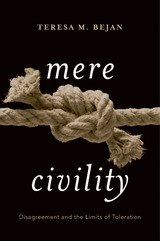
A New Statesman Best Book of the Year
A Church Times Book of the Year
We are facing a crisis of civility, a war of words polluting our public sphere. In liberal democracies committed to tolerating active, often heated disagreement, the loss of this virtue appears critical.
Most modern appeals to civility follow arguments by Hobbes or Locke by proposing to suppress disagreement or exclude views we deem “uncivil” for the sake of social harmony. By comparison, mere civility—a grudging conformity to norms of respectful behavior—as defended by Rhode Island’s founder, Roger Williams, might seem minimal and unappealing. Yet Teresa Bejan argues that Williams’s outlook offers a promising path forward in confronting our own crisis, one that challenges our fundamental assumptions about what a tolerant—and civil—society should look like.
“Penetrating and sophisticated.”
—James Ryerson, New York Times Book Review
“Would that more of us might learn to look into the past with such gravity and humility. We might end up with a more (or mere) civil society, yet.”
—Los Angeles Review of Books
“A deeply admirable book: original, persuasive, witty, and eloquent.”
—Jacob T. Levy, Review of Politics
“A terrific book—learned, vigorous, and challenging.”
—Alison McQueen, Stanford University
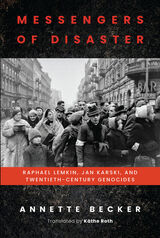
Messengers of Disaster draws upon little-known texts from an array of archives, including the International Committee of the Red Cross in Geneva and the International Tracing Service in Bad Arolsen. Carrying the knowledge of disaster took a toll on Lemkin and Karski, but their work prepared the way for the United Nations to unanimously adopt the first human rights convention in 1948 and influenced the language we use to talk about genocide today. Annette Becker's detailed study of these two important figures illuminates how distortions of fact can lead people to deny knowledge of what is happening in front of their own eyes.

Ravitzky traces the roots of Haredi ideology, which opposes the Zionist enterprise, and shows how Haredim living in Israel have come to terms with a state to them unholy and therefore doomed. Ravitzky also examines radical religious movements, including the Gush Emunim, to whom the State of Israel is a divine agent. He concludes with a discussion of the recent transformation of Habad Hassidism from conservatism to radical messianism.
This book is indispensable to anyone concerned with the complex confrontation between Jewish fundamentalism and Israeli political sovereignty, especially in light of the tragic death of Israeli Prime Minister Yitzhak Rabin.
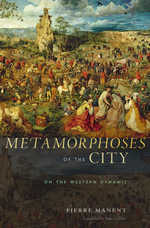
What is the best way to govern ourselves? The history of the West has been shaped by the struggle to answer this question, according to Pierre Manent. A major achievement by one of Europe's most influential political philosophers, Metamorphoses of the City is a sweeping interpretation of Europe's ambition since ancient times to generate ever better forms of collective self-government, and a reflection on what it means to be modern.
Manent's genealogy of the nation-state begins with the Greek city-state, the polis. With its creation, humans ceased to organize themselves solely by family and kinship systems and instead began to live politically. Eventually, as the polis exhausted its possibilities in warfare and civil strife, cities evolved into empires, epitomized by Rome, and empires in turn gave way to the universal Catholic Church and finally the nation-state. Through readings of Aristotle, Augustine, Montaigne, and others, Manent charts an intellectual history of these political forms, allowing us to see that the dynamic of competition among them is a central force in the evolution of Western civilization.
Scarred by the legacy of world wars, submerged in an increasingly technical transnational bureaucracy, indecisive in the face of proliferating crises of representative democracy, the European nation-state, Manent says, is nearing the end of its line. What new metamorphosis of the city will supplant it remains to be seen.
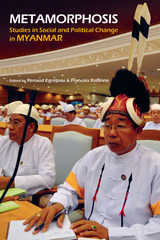
But underlying recent political transitions are other wrenching social changes and shocks, a set of transformations less clearly mapped out. Relations between ethnic and religious groups, in the context of Burma’s political model of a state composed of ethnic groups, are a particularly important “unsolved equation”.
The editors use the notion of metamorphosis to look at Myanmar today and tomorrow—a term that accommodates linear change, stubborn persistence and the possibility of dramatic transformation. Divided into four sections, on politics, identity and ethnic relations, social change in fields like education and medicine, and the evolutions of religious institutions, the volume takes a broad view, combining an anthropological approach with views from political scientists and historians. This volume is an essential guide to the political and social challenges ahead for Myanmar.


This is the key volume in the New York Metropolitan Region Study. It is a synthesis and interpretation of the seven specialized books that have already been published and the one that is still awaiting publication. Here, at last, with a depth of perspective made possible by the author's familiarity with the unpublished as well as the published findings of the other participants in the Study, is the whole picture--New York's busy and varied economy as it is now, as it has been, and as it is likely to be twenty-five years from now.
Beginning with the visible present, Mr. Vernon with swift strokes lays bare the essentials of the economic history of the New York Region. He shows how its industries grew out of one another, the part played by labor, the early crucial role of the port, and the later crucial role of "clustering" that enables firms to share common facilities. He discusses the Region's advantages and disadvantages for different kinds of business and industry, the interrelation between the jobs in the Region and the people who live in it. He traces the movement of jobs geographically in and out of the Region as a whole, and also outward within the Region, relating this outward movement to such developments as the thinning-out of population in mid-city tenements and the continuing boom in suburban split-levels. He analyzes the problems besetting the multitude of local governments in the Region, and the crisis of commuting and rapid transit services. Finally he projects the metropolis of 1985, picturing it as all the infinitely complex forces of its history to date indicate that it will be, if these forces are not altered in their future operation by governmental actions of unprecedented magnitude.
In this book there is clearly presented the information that can enable the metropolitan dwellers themselves to communicate more effectively with the experts whose business is objective evaluation of urban problems. Once that communication is established, Mr. Vernon says, "We shall have moved a giant step closer to the objective of a more tolerable metropolitan environment."

In a society which has made "urban crisis" a phrase peculiarly its own, it is strange how many different meanings are assigned to those two words. The theme of this book is that it is more important to disentangle and analyze the various problems which are indiscriminately referred to by this phrase than simply to issue a call to arms. To paraphrase the editor of The Metropolitan Enigma, James Q. Wilson, not everything about cities constitutes a problem and not all problems to be found in cities are distinctively "urban." This book seeks to explore the complexities and clear away the easy generalizations that prevent an understanding of the human problems of an urbanizing nation.
The essays in this book were written by Daniel P. Moynihan (Poverty in Cities), Bernard J. Frieden (Housing and National Urban Goals), Edward C. Banfield (Rioting Mainly for Fun and Profit), and other perceptive students of American society. Some of the papers reveal unexpected findings; others take an unusual perspective; each provides a fresh and lucid treatment of a difficult subject. No effort has been made to produce a work animated by a single point of view. A central idea of The Metropolitan Enigma is that there is no all-embracing strategy that can be put forward as an effective solution for the "urban crisis." Directed to everyone who is interested in the future of the American city, this is an important and valuable book.
The volume was first published in a soft-cover edition by the Task Force on Economic Growth and Opportunity of the United States Chamber of Commerce in 1966. The Joint Center for Urban Studies of M.I.T. and Harvard commissioned the articles. Each of the contributors has had an opportunity to revise his paper, and several essays have been substantially rewritten. Edward Banfield's essay appears here for the first time.

Metropolitan Governance is the first book to bring together competing perspectives on the question and consequences of centralized vs. decentralized regional government. Presenting original contributions by some of the most notable names in the field of urban politics, this volume examines the organization of governments in metropolitan areas, and how that has an effect on both politics and policy.
Existing work on metropolitan governments debates the consequences of interjurisdictional competition, but neglects the role of cooperation in a decentralized system. Feiock and his contributors provide evidence that local governments successfully cooperate through a web of voluntary agreements and associations, and through collective choices of citizens. This kind of "institutional collective action" is the glue that holds institutionally fragmented communities together.
The theory of institutional collective action developed here illustrates the dynamics of decentralized governance and identifies the various ways governments cooperate and compete. Metropolitan Governance provides insight into the central role that municipal governments play in the governance of metropolitan areas. It explores the theory of institutional collective action through empirical studies of land use decisions, economic development, regional partnerships, school choice, morality issues, and boundary change—among other issues.
A one-of-a-kind, comprehensive analytical inquiry invaluable for students of political science, urban and regional planning, and public administration—as well as for scholars of urban affairs and urban politics and policymakers—Metropolitan Governance blazes new territory in the urban landscape.
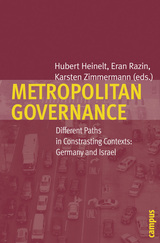
As urban areas have grown and sprawl has spread in recent decades, metropolitan governments around the world have begun to look beyond city borders, establishing regional partnerships to help them deal with issues of transit, resource use, and more. Metropolitan Governance examines this trend through a close comparative study of seven metropolitan areas in Israel and Germany. While not neglecting the reasons behind these changes in governance, the authors pay particular attention to their effects on—and diminishing of—democratic participation and accountability.
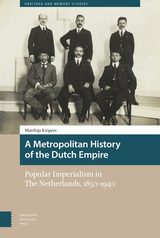
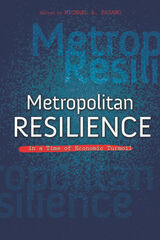
Cities, counties, school districts and other local governments have suffered a long-lasting period of fiscal challenges since the beginning of the Great Recession. Metropolitan governments continue to adjust to the "new normal" of sharply lower property values, consumer sales, and personal income. Contributors to this volume include elected officials, academics, key people in city administrations, and other nationally recognized experts who discuss solutions to the urban problems created by the Great Recession.
Metropolitan Resilience in a Time of Economic Turmoil looks at the capacity of local governments to mobilize resources efficiently and effectively, as well as the overall effects of the long-term economic downturn on quality of life. Introducing the reader to the fiscal effects of the Great Recession on cities, the book examines the initial fraying and subsequent mending of the social safety net, the opportunities for pursuing economic development strategies, the challenges of inter-jurisdictional cooperation, and the legacy costs of pension liabilities and infrastructure decay.
Contributors are Phil Ashton, Raphael Bostic, Richard Feiock, Rachel A. Gordon, Rebecca Hendrick, Geoffrey J.D. Hewings, David Merriman, Richard Nathan, Michael A. Pagano, Breeze Richardson, Annette Steinacker, Nik Theodore, Rachel Weber, and Margaret Weir.
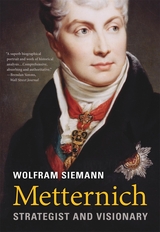
A compelling new biography that recasts the most important European statesman of the first half of the nineteenth century, famous for his alleged archconservatism, as a friend of realpolitik and reform, pursuing international peace.
Metternich has a reputation as the epitome of reactionary conservatism. Historians treat him as the archenemy of progress, a ruthless aristocrat who used his power as the dominant European statesman of the first half of the nineteenth century to stifle liberalism, suppress national independence, and oppose the dreams of social change that inspired the revolutionaries of 1848. Wolfram Siemann paints a fundamentally new image of the man who shaped Europe for over four decades. He reveals Metternich as more modern and his career much more forward-looking than we have ever recognized.
Clemens von Metternich emerged from the horrors of the Revolutionary and Napoleonic wars, Siemann shows, committed above all to the preservation of peace. That often required him, as the Austrian Empire’s foreign minister and chancellor, to back authority. He was, as Henry Kissinger has observed, the father of realpolitik. But short of compromising on his overarching goal Metternich aimed to accommodate liberalism and nationalism as much as possible. Siemann draws on previously unexamined archives to bring this multilayered and dazzling man to life. We meet him as a tradition-conscious imperial count, an early industrial entrepreneur, an admirer of Britain’s liberal constitution, a failing reformer in a fragile multiethnic state, and a man prone to sometimes scandalous relations with glamorous women.
Hailed on its German publication as a masterpiece of historical writing, Metternich will endure as an essential guide to nineteenth-century Europe, indispensable for understanding the forces of revolution, reaction, and moderation that shaped the modern world.

“A superb biographical portrait and work of historical analysis…Let us hope that it will serve if not as a manual then at least as an inspiration—good statesmanship is needed more than ever.”
—Brendan Simms, Wall Street Journal
“Brilliantly refreshes our understanding of Metternich and his era…[He] was an intellectual in politics of a kind now rare.”
—Christopher Clark, London Review of Books
“Succeed[s] in forcing readers to wonder whether Metternich’s efforts to defend an essentially conservative order against populists and terrorists are so different from the struggles that liberal democracies face today.”
—Andrew Moravcsik, Foreign Affairs
Metternich is often portrayed as the epitome of reactionary conservatism, a ruthless aristocrat who used his power to stifle liberalism and oppose the dreams of social change that inspired the revolutionaries of 1848. But in this landmark biography, the first to make use of state and family papers, Wolfram Siemann paints a fundamentally new image of the man, revealing him to be more forward-looking and nimble than we have ever recognized.
Clemens von Metternich emerged from the horrors of the Revolutionary and Napoleonic wars committed above all to the preservation of peace. As the Austrian Empire’s foreign minister and chancellor he was, as Henry Kissinger has observed, the father of realpolitik. But short of compromising on his overarching goal, Metternich aimed to accommodate liberalism and nationalism. Siemann draws on previously unexamined archives to bring this dazzling man to life.
Hailed as a masterpiece of historical writing, Metternich is indispensable for understanding the forces of revolution, reaction, and moderation that shaped the modern world.
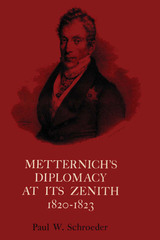
What Metiernich wanted at the peak of his career, why he wanted it, and the methods by which he achieved his goals are questions brilliantly answered in this survey and analysis of the Austrian chancellor's diplomacy during the period when he was the pre-eminent figure in European politics.
Metternich's single-minded objective during 1820–1823 was to preserve the Austrian hegemony he had gained in Central Europe after long wars, enormous effort, and great sacrifice. If the internal security and international-power position secured by Austria at the Congress of Vienna were to be defended against the impact of widespread revolution in Europe, it was imperative that peace in Europe and the status quo be maintained. This required an unyielding opposition to all political movements that might disturb the equilibrium, especially French chauvinism and the spread of French constitutional ideas.
A one-man distillate of the doctrine of absolute monarchy, Metternich was the relentless foe of any cause, just or unjust, that threatened European repose. Hence, when the revolution in Naples seriously menaced Austrian hegemony in Italy, Metternich determined that the constitutional regime in Naples must be overthrown by an Austrian armed force, an absolute monarchy restored, and an Austrian army of occupation kept there. Nor did he scruple to use duplicity, secret negotiation, trickery, or deceit against ally and adversary alike in his effort to enlist them in the common cause of all thrones. At the Congress of Troppau, Metternich succeeded not only in defeating Russian ideas for peaceful intervention and a moderate constitution at Naples, but also in converting Tsar Alexander to thoroughly conservative views, thereby making Russia a powerful supporter of Austrian policies and knowingly alienating England, formerly Austria's closest ally.
Paul W. Schroeder brings to this bookexceptional scholarship and an objectivity hard to attain when dealing with a personality. Although Metternich, as Schroeder sees him, doubtless helped to maintain European peace and order, his real greatness consisted not in his European principles, but in his ability to defend Austrian interests under the guise of European principles. The evidence, gathered from documentary material in the Haus Hof- und Staatsarchiv in Vienna, has forced the author to the conclusion that Metternich was no real statesman. The very qualities that distinguished him as a brilliant diplomat—keen vision, cogent analysis, fertility of expedients, farsightedness, flexibility, and firmness of purpose—were converted into those of blindness to reality, superficial analysis, sterility of expedients, dogmatism, and failure of will when confronted with fundamental problems of state and society.

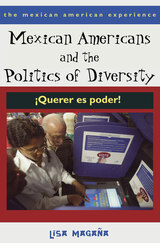
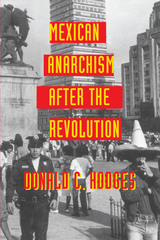
Formal anarchist organizations disappeared in Mexico after the 1910 Revolution, but anarchist principles survive in the popular resistance movements against the post-revolutionary governments. In this book, Donald Hodges offers the first comprehensive treatment of the intellectual foundations, history, politics, and strategy of Mexican anarchism since the Revolution.
Hodges interviewed leading Mexican anarchists, including Mónico Rodríguez Gómez, and gained access to documents of numerous guerrilla organizations, such as the previously missing "Plan de Cerro Prieto." Using both original and published sources, he shows how the political heirs of Ricardo Flores Magón, Mexico's foremost anarchist, agitated for workers' self-management and agrarian reform under the cover of the Mexican Communist party, how they played an important role in the student rebellion, and how, in the face of a labor movement that has come under government control, anarchism is currently experiencing a rebirth under another name.
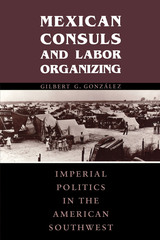
Chicano history, from the early decades of the twentieth century up to the present, cannot be explained without reference to the determined interventions of the Mexican government, asserts Gilbert G. González. In this pathfinding study, he offers convincing evidence that Mexico aimed at nothing less than developing a loyal and politically dependent emigrant community among Mexican Americans, which would serve and replicate Mexico's political and economic subordination to the United States.
González centers his study around four major agricultural workers' strikes in Depression-era California. Drawing on a wide variety of sources, he documents how Mexican consuls worked with U.S. growers to break the strikes, undermining militants within union ranks and, in one case, successfully setting up a grower-approved union. Moreover, González demonstrates that the Mexican government's intervention in the Chicano community did not end after the New Deal; rather, it continued as the Bracero Program of the 1940s and 1950s, as a patron of Chicano civil rights causes in the 1960s and 1970s, and as a prominent voice in the debates over NAFTA in the late 1980s and early 1990s.

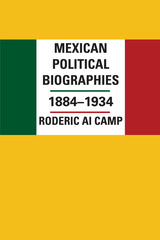
Here is an authoritative reference work that makes biographies of prominent Mexican national politicians from the period 1884–1934 available in English. Like the author's biographical directory for the years 1935–2009, it draws on many years of research in Mexico and the United States and seeks not only to provide accurate biographical information about each entry but also, where possible and appropriate, to connect these politicians to more recent leadership generations. Thus, Mexican Political Biographies, 1884-1934 not only is a useful historical source but also provides additional information on the family backgrounds of many contemporary figures.
The work includes those figures who have held specific posts at the national level or who have served as state governors. Each biographical entry contains the following information: date of birth, birthplace, education, elective political office, political party positions, appointive governmental posts at all levels, group activities, nongovernmental positions and professions, relatives, mentors and important friends, military experience, unusual career activities, and published biographical sources.
Another unique feature of the directory is appendixes with complete lists of the names and dates of cabinet members, supreme court justices, senators, deputies, selected ambassadors, and party leaders.
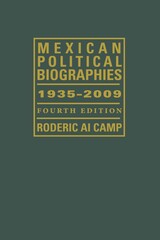
This fourth edition of Roderic Camp's highly respected Mexican Political Biographies is an updated comprehensive biographical directory of leading state and national politicians in Mexico, covering the years 1935–2009. The original edition, published in 1976, was the first and only comprehensive biographical work on contemporary political figures in any language and served as the prototype for the Mexican government's brief foray into its own official biographical directory. The Mexican Supreme Court has cited every biography of justices in the third edition as the basis of its biographies in the late 1980s.
With updates of the existing biographies and appendices, plus almost 1,000 additional biographies, this fourth edition now features close to 3,000 entries and serves as a unique resource list of the chronological occupants of all leading national political posts. The need for such information has become even more pronounced since Mexico's political transformation from a semi-authoritarian to a democratic model.
This latest edition allows readers access to information about Mexican politicians into the new century, and like its earlier versions, will be a valuable tool for government officials, journalists, historians, social scientists, the business community, and students.
Finally, it includes a detailed bibliographic essay that identifies and explains the significance of biographical sources and has been enhanced by numerous up-to-date Internet sources. An added convenience is an accompanying CD that allows readers to search the biographies and appendices, enhancing the longevity, usefulness, and uniqueness of this edition.
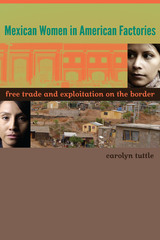
Prior to the millennium, economists and policy makers argued that free trade between the United States and Mexico would benefit both Americans and Mexicans. They believed that NAFTA would be a “win-win” proposition that would offer U.S. companies new markets for their products and Mexicans the hope of living in a more developed country with the modern conveniences of wealthier nations. Blending rigorous economic and statistical analysis with concern for the people affected, Mexican Women in American Factories offers the first assessment of whether NAFTA has fulfilled these expectations by examining its socioeconomic impact on workers in a Mexican border town.
Carolyn Tuttle led a group that interviewed 620 women maquila workers in Nogales, Sonora, Mexico. The responses from this representative sample refute many of the hopeful predictions made by scholars before NAFTA and reveal instead that little has improved for maquila workers. The women’s stories make it plain that free trade has created more low-paying jobs in sweatshops where workers are exploited. Families of maquila workers live in one- or two-room houses with no running water, no drainage, and no heat. The multinational companies who operate the maquilas consistently break Mexican labor laws by requiring women to work more than nine hours a day, six days a week, without medical benefits, while the minimum wage they pay workers is insufficient to feed their families. These findings will make a crucial contribution to debates over free trade, CAFTA-DR, and the impact of globalization.
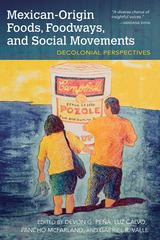
This collection of new essays offers groundbreaking perspectives on the ways that food and foodways serve as an element of decolonization in Mexican-origin communities.
The writers here take us from multigenerational acequia farmers, who trace their ancestry to Indigenous families in place well before the Oñate Entrada of 1598, to tomorrow’s transborder travelers who will be negotiating entry into the United States. Throughout, we witness the shifting mosaic of Mexican-origin foods and foodways in the fields, gardens, and kitchen tables from Chiapas to Alaska.
Global food systems are also considered from a critical agroecological perspective, including the ways colonialism affects native biocultural diversity, ecosystem resilience, and equality across species, human groups, and generations.
Mexican-Origin Foods, Foodways, and Social Movements is a major contribution to the understanding of the ways that Mexican-origin peoples have resisted and transformed food systems. It will animate scholarship on global food studies for years to come.
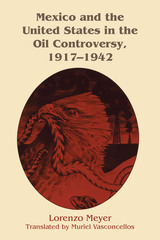
From reviews of the Spanish edition:
“Meyer’s perceptive commentary on Mexican power politics presents new insights into the petroleum lobbies in Mexico City and Washington. With unbiased empathy he shows the validity of Mexico’s complaints about foreigners’ deriving an overabundance of profit from a nonrenewable natural resource. He understands United States history and never abuses his license to criticize.” —Hispanic American Historical Review
“This useful addition to the literature on twentieth-century Mexican–United States diplomatic relations is a scholarly work, worthy of consideration by all students of the subject.”—American Historical Review
Mexico and the United States in the Oil Controversy, 1917–1942 explores the relationship between the United States and Mexico during the first half of the twentieth century, with special attention to the Mexican nationalization of the oil industry. Relying on Mexican archival material never before analyzed, the author presents a unique perspective on the period following the Mexican Revolution and Mexico’s efforts to diminish its economic dependency on the United States. This work not only describes the political and economic struggle between the Mexican government and the U.S. oil companies but also serves to illustrate in general the nature of dependency between Latin American countries and the United States. It will be of interest not only to Mexican specialists but also to diplomatic and economic historians.
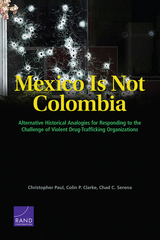
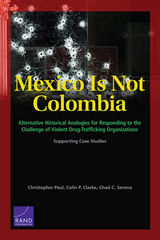
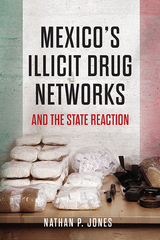
Mexican drug networks are large and violent, engaging in activities like the trafficking of narcotics, money laundering, extortion, kidnapping, and mass murder. Despite the impact of these activities in Mexico and abroad, these illicit networks are remarkably resilient to state intervention.
Drawing on extensive fieldwork and interviews with US and Mexican law enforcement, government officials, organized crime victims, and criminals, Nathan P. Jones examines the comparative resilience of two basic types of drug networks—“territorial” and “transactional”—that are differentiated by their business strategies and provoke wildly different responses from the state. Transactional networks focus on trafficking and are more likely to collude with the state through corruption, while territorial networks that seek to control territory for the purpose of taxation, extortion, and their own security often trigger a strong backlash from the state.
Timely and authoritative, Mexico's Illicit Drug Networks and the State Reaction provides crucial insight into why Mexico targets some drug networks over others, reassesses the impact of the war on drugs, and proposes new solutions for weak states in their battles with drug networks.
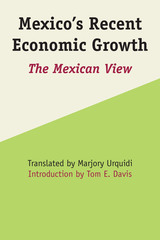
The Mexican economy underwent a process of growth and transformation in the twentieth century, which was confirmed by the indexes and figures that economists use to chart the rate of growth, even allowing for possible inaccuracies in these figures.
This volume of six essays makes readily available to English-speaking readers a selection of significant contributions by outstanding Mexican economists dealing with the mid-twentieth-century growth of the Mexican economy.
Enrique Pérez López provides an overview of the development of the gross national product in the economy and the structural changes that were imperative if basic social goals were to be implemented and the optimal adjustments to changing world conditions effected. Ernesto Fernández Hurtado discusses the process of accommodation and cooperation between the public and the private sectors that has contributed significantly to economic growth, stressing particularly the role of agriculture. Mario Ramón Beteta describes central bank policy and the functioning of the Central Bank, showing how control over credit and the banking system assures stability and accelerating growth through its credit rationing.
Alfredo Navarrete R. traces the sources of domestic savings that have provided 90 percent of the capital employed in the economy since the Revolution, and Ifigenia M. de Navarrete demonstrates that rapid economic growth has not resulted in a more equitable distribution of income. Victor Urquidi stresses the balanced growth, achieved by allocating public capital formation to basic infrastructure, that has helped develop agriculture as well as industry, and indicates the nature of the structural change that must occur if the economy is to expand rapidly.
In his introduction Tom E. Davis compares growth in Mexico with developments during the same period in Chile and Argentina.
The country reached its midcentury standard of living after fifty years of drastic social and political changes under a constitution that altered the system and the concept of private property and the role of the state. These new concepts brought about changes in the structure of production and social relationships, together with a rise to new cultural, technical, and moral levels. These changes, in turn, placed Mexico in a new position with new problems. A question that must be answered is whether the economic goals of the future require a reappraisal of social relationships and of the ways of administering and utilizing the country’s resources and potential productivity.
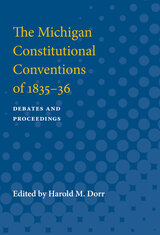
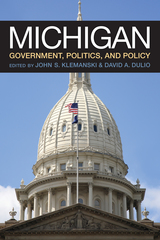
As the state continues to deal with many of these challenges, Michiganders more than ever need a clear picture of how their state’s political institutions, actors, and processes work. To that end, this book provides a comprehensive analysis of Michigan’s politics and government that will help readers better understand the state’s history and its future prospects. Chapters elucidate the foundational aspects of the state’s government (the Michigan Constitution and intergovernmental relations); its political institutions (the state legislature, governor, and court system); its politics (political parties and elections); and its public policy (education, economic development, and budget and fiscal policy). The book’s four themes—historical context, decline, responses to challenges, and state-local government relations—run throughout and are buttressed by coverage of recent events. Moreover, they are brought together in a compelling chapter with a particular focus on the Flint water crisis.
An ideal fit for courses on state and local government, this thorough, well-written text will also appeal to readers simply interested in learning more about the inner workings of government in the Great Lakes State.
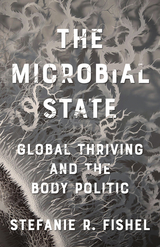
For three centuries, concepts of the state have been animated by one of the most powerful metaphors in politics: the body politic, a claustrophobic and bounded image of sovereignty. Climate change, neoliberalism, mass migration, and other aspects of the late Anthropocene have increasingly revealed the limitations of this metaphor. Just as the human body is not whole and separate from other bodies—comprising microbes, bacteria, water, and radioactive isotopes—Stefanie R. Fishel argues that the body politic of the state exists in dense entanglement with other communities and forms of life.
Drawing on insights from continental philosophy, science and technology studies, and international relations theory, this path-breaking book critiques the concept of the body politic on the grounds of its very materiality. Fishel both redefines and extends the metaphor of the body politic and its role in understanding an increasingly posthuman, globalized world politics. By conceiving of bodies and states as lively vessels, living harmoniously with multiplicity and the biosphere, she argues that a radical shift in metaphors can challenge a politics based on fear to open new forms of global political practice and community.
Reframing the concept of the body politic to accommodate greater levels of complexity, Fishel suggests, will result in new configurations for the political and social organization necessary to build a world in which the planet’s inhabitants do not merely live but actively thrive.
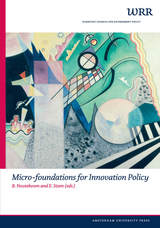
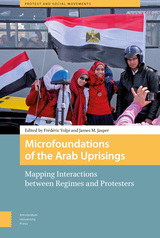

Micro-Politics was first published in 1994. Minnesota Archive Editions uses digital technology to make long-unavailable books once again accessible, and are published unaltered from the original University of Minnesota Press editions.
Patricia S. Mann explains our current period as a time of social transformation resulting from an "unmooring" of women, men, and children from the nuclear family, gender relations having replaced economic relations as the primary site of social tension and change in our lives. The feminist movement has evolved, according to Mann, into a popularly based postfeminist struggle to reconstruct relationships between women and men within everyday contexts of work, family, education, and politics.
Mann formulates a "postmodern" theory of political agency, utilizing it to explain political events such as the Hill-Thomas Senate hearings and their social aftermath. While liberal and progressive theories have explained political agency in terms of individual or group forms of identity, Mann suggests another alternative. Individuals such as Anita Hill are drawn into socially meaningful struggles in the context of their daily lives-as we all are potentially participating in micro-political forms of activism in a variety of institutional contexts. These dynamic micropolitical situations involve intersecting dimensions of race, class, and sexuality, as well as gender. Within specific conflicts, individuals rearticulate their notions of desire and responsibility, and their expectations for recognition and reward; according to Mann political agency resides in these choices. Addressing some of the most important controversies in political philosophy, Mann weaves together strands of the "participatory politics" of the 1960s and the multicultural politics of the 1990s. In doing so, she offers a new basis for understanding social change.READERS
Browse our collection.
PUBLISHERS
See BiblioVault's publisher services.
STUDENT SERVICES
Files for college accessibility offices.
UChicago Accessibility Resources
home | accessibility | search | about | contact us
BiblioVault ® 2001 - 2024
The University of Chicago Press









